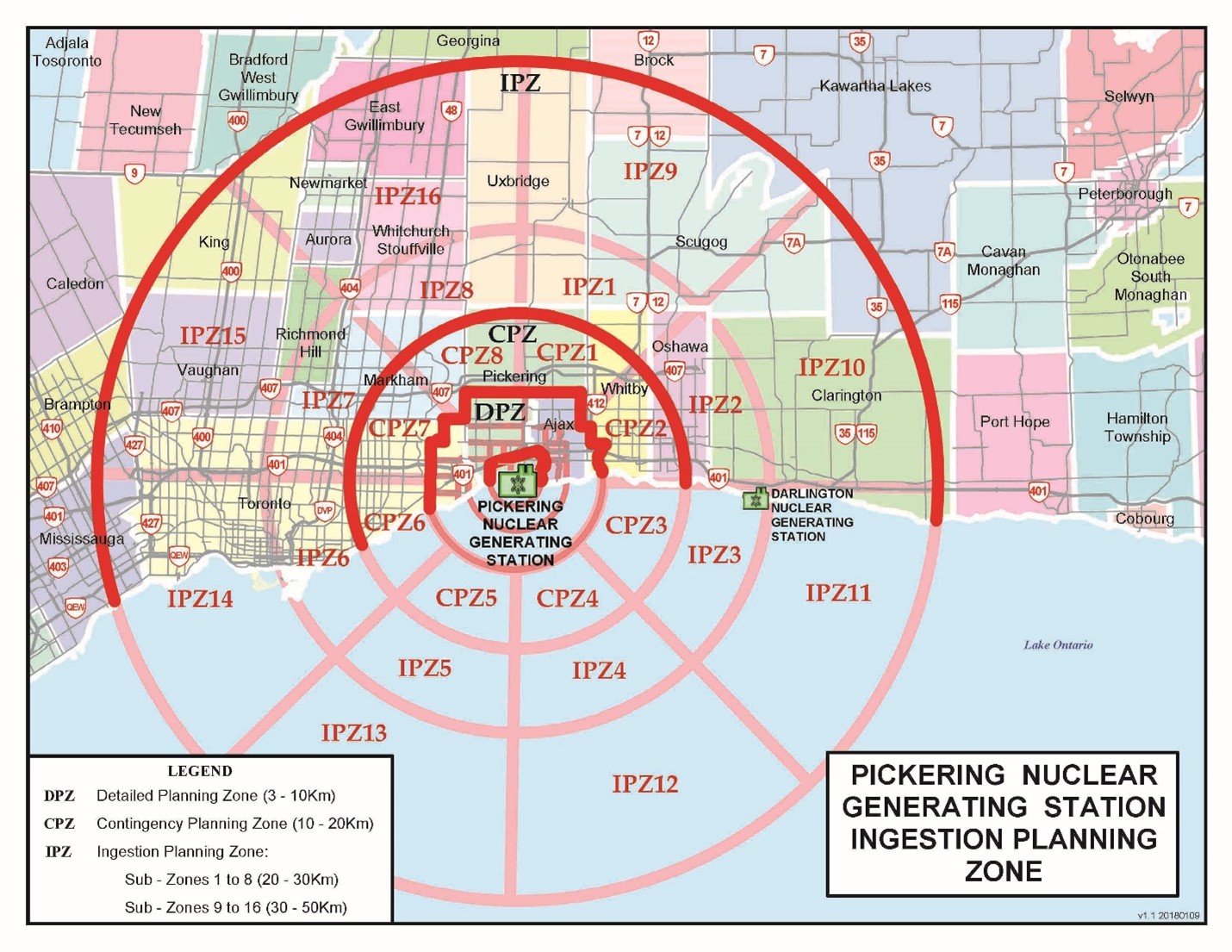Potassium iodide (KI) Pill Working Group
In 2019, the CNSC established the Potassium Iodide (KI) Pill Working Group and the related Advisory Committee to provide clarity on the existing plans and associated responsible authorities for distributing KI pills in the Ingestion Planning Zone (IPZ) in the event of an emergency at the Pickering Nuclear Generating Station (see figure 1).
The Working Group, chaired by the CNSC, is co-chaired by Emergency Management Ontario (EMO), the Ontario Ministry of Health (MOH) and Ontario Power Generation (OPG). The Working Group also includes representatives from Health Canada and representatives from the public health units, as well as the emergency management coordinators, from Peel Region; York Region; City of Toronto; Durham Region; Simcoe Muskoka District; Haliburton, Kawartha, Pine Ridge District; and Peterborough County.
Phase I of the Working Group was completed on January 26, 2023. Read the full report here.
On this page:
- What is KI?
- Phase I of the Working Group
- Phase II of the Working Group
- Terms of Reference
- Meeting minutes for Phase I
- CNSC Advisory Committee
- Related links

Figure 12: Text version
A map of the Greater Toronto Area, centred on the Pickering Nuclear Generating Station Ingestion Planning Zone. The map displays the detailed planning zone, which is 3 to 10 km away; the contingency planning zone, which is 10 to 20 km away; and the ingestion planning zone, which is 20 to 50 km away.
Source: Province of Ontario’s Office of the Fire Marshal and Emergency Management
What is KI?
In the event of a nuclear emergency, KI is effective in reducing the threat of thyroid cancer for residents at risk of inhaling or ingesting radioactive iodine. The CNSC established regulatory requirements for nuclear power plant licensees to ensure that KI pills are pre-distributed to everyone within 10 km of all power plants. Regional, municipal and provincial authorities responsible for emergency management, including the Province of Ontario’s Office of the Fire Marshal and Emergency Management and the New Brunswick Emergency Measures Organization, also facilitate the pre-distribution of KI pills.
Phase I of the Working Group
Phase I of the Working Group was completed on January 26, 2023, when CNSC staff presented the Phase I report to
the Commission at a public meeting.
The objective of Phase I, as outlined in the
Terms of Reference, was to fulfill a commitment to the Commission to provide clarity on the following:
- existing provincial and federal plans for the distribution of KI pills
- considerations and education concerning KI pill emergency distribution in the IPZ
- means of KI pill distribution in relation to other factors associated with a nuclear emergency response
- availability and scope of public emergency preparedness information
Phase II of the Working Group
In August 2022, EMO, in conjunction with the MOH, proposed a revised approach to Phase II, where EMO would lead Phase II and consider the associated objectives while drafting the 2023 update to the Provincial Nuclear Emergency Response Plan (PNERP). The objectives of Phase II include the following:
- determine the feasibility of pre-distribution of KI pills to all schools within the IPZ
- establish clear and detailed plans for the distribution of KI pills throughout the IPZ, if necessary, following the completion of Phase I
In October 2022, senior management of the signatory organizations agreed to EMO’s revised approach to Phase II. The CNSC will remain the chair of the Working Group and will facilitate meetings in support of EMO’s completion of Phase II.
The 2023 update to the PNERP will undergo a 60-day public review, led by EMO.
Terms of Reference
The Terms of Reference are being revised to reflect the new approach to Phase II.
Meeting minutes for Phase I
- August 15, 2019
- October 16, 2019
- November 4-5, 2019
- December 20, 2019
- February 13, 2020
- November 5 and 10, 2020
- September 28, 2021
CNSC Advisory Committee
The purpose of the CNSC Advisory Committee is to ensure that opportunities are provided for meaningful engagement on the outputs of the CNSC KI Pill Working Group. The Advisory Committee includes representatives from the Canadian Environmental Law Association, Toronto District School Board, Toronto Catholic District School Board, Bruce Power, the Municipality of Kincardine, and academia. The Advisory Committee is expected to review the key deliverables of the Working Group (i.e., TOR, Phase I report, Phase II report) and advise as to whether the mandate of the Working Group as defined in the TOR has been achieved. Operating procedures were developed to establish the framework and guiding principles of the Advisory Committee’s role with respect to the Working Group.
To align with the new approach to Phase II, the CNSC Advisory Committee will hold a meeting during the public review period for the 2023 update to the PNERP. This will provide an opportunity for members to engage on and discuss the updated PNERP so that each member can submit their respective comments to EMO as part of the public review.
Meeting minutes for Phase I
For more information, please contact cnsc.info.ccsn@cnsc-ccsn.gc.ca.
Related links
Page details
- Date modified: